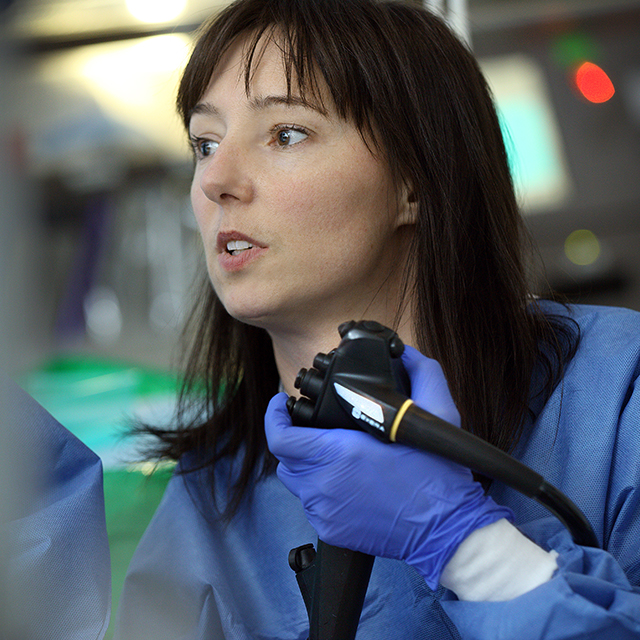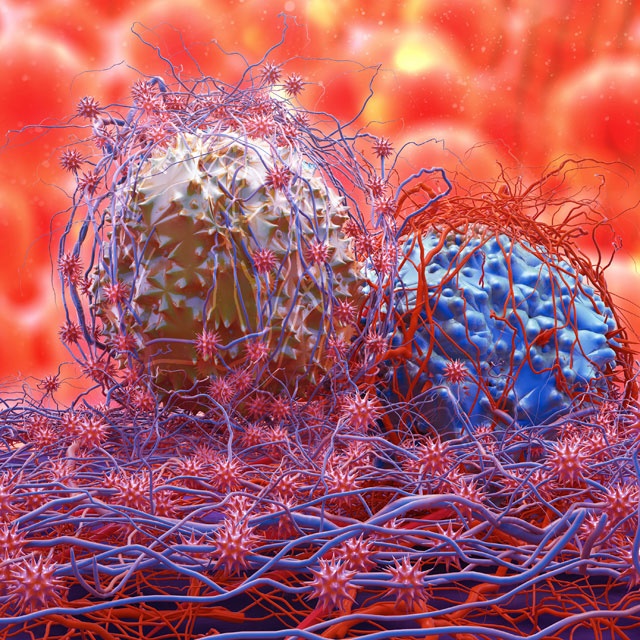In 2018, gastroenterologist Anne Marie Lennon and a team of researchers published news about a blood test they designed that can detect cancer. Last summer, they took the next step by incorporating the blood test into the routine clinical care of more than 10,000 women with no history of cancer.
“That’s the goal, isn’t it?” says Lennon. “Identifying cancer at an earlier stage when it can be effectively treated, improving patients’ long-term survival.”
In addition to her duties as director of the Division of Gastroenterology and Hepatology at the Johns Hopkins University School of Medicine, Lennon works with a team of world-leading geneticists, pathologists, radiologists, biostatisticians and other researchers on new ways to detect cancer.
Lennon and her colleagues published results of their study in the journal Science in July 2020. Among the authors are Johns Hopkins professors of oncology Kenneth Kinzler, Alison Klein, Nick Papadopoulos and Bert Vogelstein; members of the Johns Hopkins pathology, biostatistics, radiology and epidemiology divisions; as well as a team from Pennsylvania’s Geisinger Health System.
In designing the study, the researchers asked four key questions:
- Can a multicancer blood test prospectively detect cancer in people whose disease wasn’t previously found by other means?
- Can such a test be used to intervene in the cancer-progression process, leading to therapy with intent to cure?
- Can such a test be incorporated into routine care and not discourage participants from getting the current standard-of-care screenings?
- Can such a test be performed safely, without incurring futile, invasive follow-up tests?
In its 2018 publication, the group introduced a blood test called “CancerSEEK.” The test relied on circulating tumor DNA and cancer protein markers to detect the disease. Sensitive enough to isolate an individual mutant DNA fragment among 10,000 normal ones, the CancerSEEK test offered high sensitivity, while maintaining a specificity of better than 99%. CancerSEEK was 98.9% accurate when it ruled out cancer.
“That specificity is especially important if we’re to use this test in people who have no history of cancer,” Lennon says.
In the most recent study, the group prospectively evaluated 10,006 women with no history of cancer with the CancerSeek test. Ninety-six tested positive for some form of cancer.
“Although that number sounds low,” Lennon says, “it’s actually what you’d expect from a group of this size and this age range.”
Of those 96 cancers, 26 were first detected by the CancerSEEK blood test. The test was able to find cancers in 10 different organs. One of the particularly exciting findings was that 14 of 45 cancers were in organs for which no standard screening exists. For example, of the seven ovarian cancers found during the study, six were detected with CancerSEEK.
Screening procedures such as colonoscopy or mammogram have been effective in detecting cancers. Lennon sees CancerSeek as a potentially useful addition to those screenings.
“Our study shows that current screening is very good at detecting some cancers, such as breast cancer,” Lennon says. “But for things like lung cancer, this blood test is complementary.” Of the 22 lung cancers, three were detected through screening with low dose CT, and nine were detected with the blood test. One of the key findings of the study was that use of the blood test did not decrease participation in standard-of-care screening. In this study, use of the CancerSEEK blood test doubled the number of cancers detected compared with current screening alone.
Finally, 99% of the study’s participants required no follow-up of blood testing results, and less than half a percent underwent an unnecessary and invasive diagnostic procedure caused by a false positive test result.
Lennon and her colleagues are encouraged by the study’s results.
“The screening methods that we have are good, but not all cancers have screening tests. For instance, there’s no routine screening for ovarian cancer,” says Lennon. “This study has shown that it’s possible to detect cancers, including early cancers, leading to surgery with the intent to cure in individuals with no history of cancer with a blood test — that a blood test can be incorporated into routine clinical care without discouraging patients from engaging in other forms of screening, and that testing can be performed in safe manner.”


